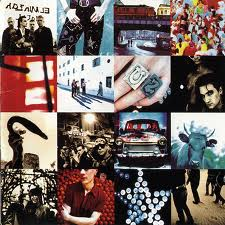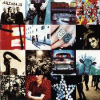 Originally published by L.S. Media. October 31st 2011.
Originally published by L.S. Media. October 31st 2011.
L.S. Media Rating *****
In a typical grandiose style that you would expect from one of the premier Irish Rock bands of the last thirty years, U2 celebrate the 20th anniversary of their 1991 album Achtung Baby with the re-release of one of the band’s finest albums.
Never ones to stand still or react to criticism in the normal Rock and Roll way, the four Irish men who had thrilled audiences with Boy and War in their early career and carried on that fine tradition with The Joshua Tree but who had been slammed savagely for their venture and exploration of American roots music on the album Rattle and Hum took solace and time out to come back with an album of sheer intensity, climatic differing styles and lyrics that make your heart bleed.
To understand the album is to understand the band. The output of work they have released since, the copies they have sold really pales into insignificance when viewed against the times they recorded Achtung Baby in, the intense pressure they found themselves under, perhaps for the first time since they started out and the album that was conceived in that claustrophobic atmosphere. Its darker, almost bleak new age industrialism in parts, it feels suffocating and yet there is a freedom that made people sit up and listen to the band again, they had something new to say without betraying their ethics or starting point.
Zoo Station, the opening song on the album, typifies the industrialism feel, the sense of anger, betrayal and even a glimmer of hope that is sprinkled sparingly throughout the record. It is an album that deals with the internal, the human as a machine, a piece of industrial waste built with real emotions such as inadequacy and a long since dead appetites. There is no room for political motivation as there is on the early albums; this is a creative piece of work celebrating humanity’s loves and desires, all of which can lead to inner conflict and a stifling sensation.
Nowhere does this album concentrate more on this new and refreshing attitude than on the band’s ballad, the beautiful and haunting One. The lyrics offer much in the way of looking at two people who have been through the struggle of understanding their place within a relationship. The lyrics contain the lines “Have you come here for forgiveness? Have you come here to raise the dead? Have you come here to play Jesus to the lepers in your head?” The raw emotion that Bono sings these lines is heartfelt and striking, it invokes memories of failure and the hope of reconcilement that ultimately will never happen. A song that also highlights how good the band were as a unit, with the guitars, drums and vocal arrangements just technically amazing and the best the group had done since 1984’s Pride (in the Name of Love).
The general feeling of Inadequacy is telegraphed all the way through the album, perhaps in a way acting as a confessor to the harshness and response to Rattle and Hum, however by laying their hearts on the line rather than their political heads the band were able to achieve a greatness that has made them one of the biggest acts on the planet and made the four men what they are today. Had they stuck their necks out and carried on down the road of covers and gospel music driven tracks, all that they have achieved since may never have happened, the history of U2 may have been a very different place.
The 20th Anniversary of this, perhaps U2’s greatest recorded moment is timely, recorded in the days after the fall of the Berlin Wall and the re-unification of Germany will serve as a reminder to the troubles Europe and the wider world finds itself in today. No man is an island; no human should feel the inadequacy foisted upon them by another.
The album itself was finally released on the 19th November 1991 and is a barnstormer of a piece of recording history and deserves its place as one of the most revered records of the time and the awards and merits it received.
Ian D. Hall
